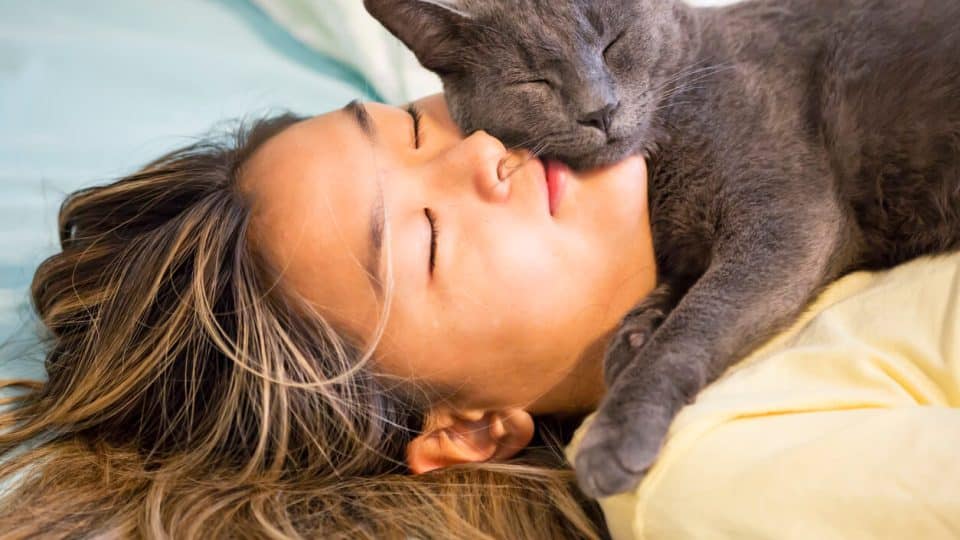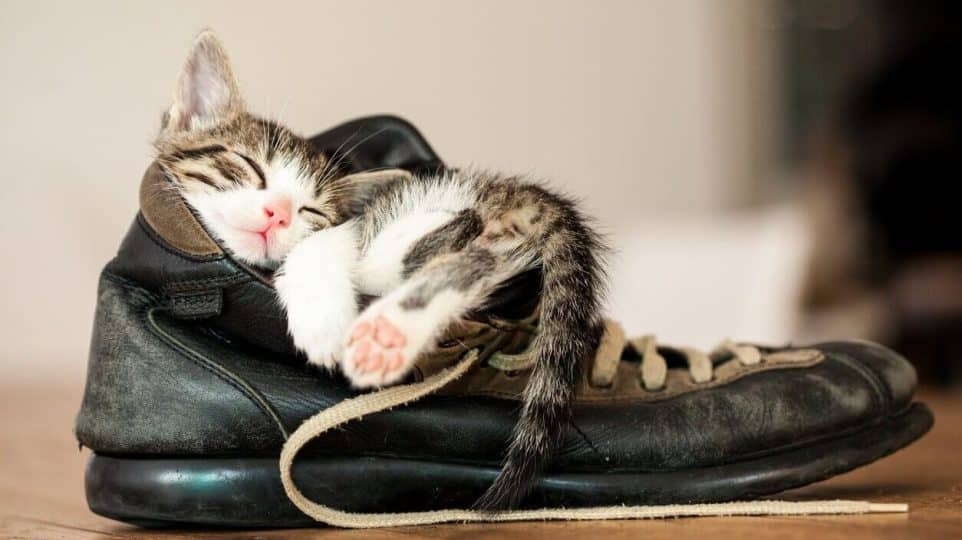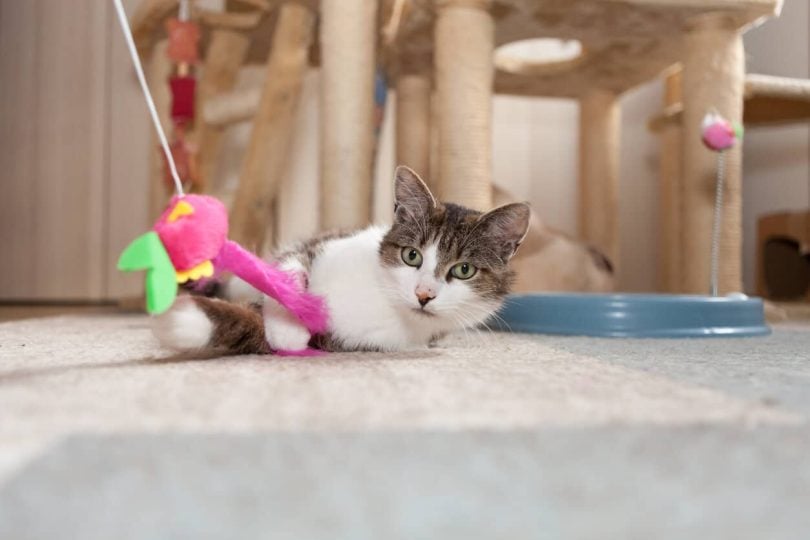You might catch your cat napping frequently throughout the day, and their play sessions might wake you up at night, too! But cats aren’t nocturnal. They’re crepuscular—most active at dusk and dawn, in other words. They’re also polyphasic sleepers, which means they take plenty of naps in between those times.
“Dawn and dusk are when birds and mice are very active, so cats adapt their hunting patterns to their prey,” says Stephen Quandt, cat behavioural specialist and founder of Cat Behavior Help in the USA.
Cats have a reputation for sleeping a lot, especially during the day (to fuel their late-night zoomies, of course). But according to Quandt, healthy cats who get plenty of daytime enrichment shouldn’t stay up all night.
Want your cat’s sleep patterns to line up with your own schedule? Quandt doesn’t recommend disturbing their daily naps—but he does offer some alternate methods to help your crepuscular cat sleep through the night. Read on to discover more about your cat’s waking and sleeping patterns.
Do Cats Get Any Sleep At Night?
Cats aren’t nocturnal, so they do spend some of the night asleep—just not most of it as we do. Instead, they take multiple naps throughout a 24-hour period due to their polyphasic sleep pattern, Quandt explains.
Cats sleep like this because they’re both predator and prey. Polyphasic (meaning ‘many phases’) sleep allows them to stay alert enough to swiftly escape predators when needed. In comparison, humans are typically diurnal—mostly active during the day—and have one primary sleep cycle at night.
Like humans, cats experience both rapid eye movement (REM) sleep and non-rapid eye movement sleep (non-REM), with most of their sleep spent in the non-REM phase, according to Quandt.
“We see cats twitching in their whiskers and paws during sleep, and that’s when they’re dreaming,” he says. “Even though they also tend to sleep very lightly, they do have short periods of sleep that are so deep it can be hard to wake them.”
Why Are Cats Crepuscular?
Your cat isn’t confused about the time. Their internal clocks are set to wake at twilight and dawn, Quandt says. This schedule helps them hunt successfully while also staying safe from predators.
Happy house cats get food from their pet parents, of course, so they don’t need to hunt for their meals. But Quandt says sometimes instinct proves difficult to resist, which is why your cat may prod—or lick, pat, or serenade—you awake closer to dawn.
Cats also have special adaptations that make life easier for them at dawn and dusk, including:
- Low-light eyesight. Have you ever seen your cat’s eyes glowing in the dark? That’s called eyeshine, and it happens because cats’ eyes have specially evolved to absorb as much light as possible in low-light settings.
- Coat colour and patterns. A cat’s coat serves a crucial purpose in their survival. Depending on a cat’s genetics, they may possess melanism, a trait that results in an abundance of dark pigmentation. This adaptation provides camouflage, allowing them to blend seamlessly into low-light surroundings.
- Whiskers. Cats rely on their whiskers to navigate their environment, both in dimly lit conditions and during the day. Whiskers located on their muzzle, above their eyes, and on the back of their limbs allow them to sense vibrations and fluctuations in air movements.
Different Cat Groups And Their Sleep Patterns
| Type of Cat | Sleeping Behaviour |
| Indoor cats | Crepuscular with lower nighttime activity |
| Outdoor cats | Crepuscular with increased nighttime activity |
| Wild cats | Wild cats’ sleep patterns depend on the species. Quandt says some wild cats are nocturnal—tigers are one example. Others, like pumas, are crepuscular. |
Indoor domestic cats tend to adjust their sleeping patterns to their pet parent’s schedule. In other words, your cat may end up sleeping through the night just like you do.
“If we’re out at work, they will be more likely to sleep. When we’re home, they become conditioned to ask to play when we’re up and around,” Quandt says. On the other hand, outdoor domestic cats tend to stick to a more natural schedule.
Some wild cats are nocturnal
When it comes to wild felines like lions and tigers, they generally avoid activity during the heat of the day and stick to hunting at dawn, dusk, or nighttime.
They also sleep for much longer periods than domestic cats because they expend lots of energy on the hunt. They also eat a ‘banquet’s worth’ before sleeping, Quandt says.
Should You Wake A Sleeping Cat?
Ever heard the phrase “Let sleeping dogs lie”? Well, you can apply that to your feline friends, too.
Rather than waking a napping cat, Quandt suggests a more effective method for helping your cat sleep through the night: Play out a full predation cycle about an hour before bedtime.
“That means a play session—the hunt—followed by a meal. Then, nature tells them to sleep and conserve calories,” he says.
For example, you might try a game of laser tag, chase the mouse, or go fish with a wand toy.
Quandt also recommends feeding cats multiple small meals throughout the day, since they eat up to 15 meals a day in the wild! If your cat eats smaller meals a few times a day, they may end up getting better sleep at night—which means better sleep for you, too!





